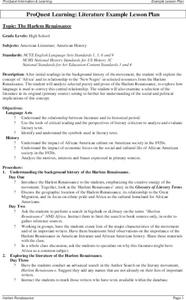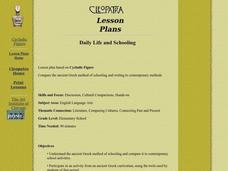Curated OER
Who Speaks Modern English and Where ?
Students predict the widespread effects of the English language and consult on-line charts and text to verify their findings.
Curated OER
Modernism in Poetry, Painting, and Music
Are you teaching Modernism to your class? Connect different areas of artistic expression in the Modernist Era. Learners read T.S. Eliot, view art by Pablo Picasso, and listen to a Modernist musical composition. This final assignment is...
Curated OER
Book Illustrations and Their Illustrators as Artists-K-3
Help learners construct relationships between written narratives and book illustrations, and between the narratives in formal visual art and the subject of the visual art. Look at Caldecott winning books and focus on the pictures drawn....
Curated OER
Different People/Different Times
Learners read and compare two selections by two different authors with the theme man vs. nature. They complete a literary analysis paper comparing and contrasting the author's treatment of the topic with emphasis on setting, historical...
Curated OER
Prairie Poetry
Ninth graders take note of the ways in which word choice, rhythm, language and narrative voice, as well as point of view in a poem can be used to evoke a time and place. They use their insights to create a poem of their own.
Curated OER
Word Search: Revolutionary War on Wednesday
In this literature based word search, students find and mark 15 words in the word search. The words pertain to the book, Revolutionary War on Wednesday.
Curated OER
Essential English: List of Common Uncountable Nouns
In this essential English worksheet, students will read a list of more than 75 common uncountable nouns. The list is in alphabetical order and includes words like pressure and history.
Curated OER
Teaching African Literature in English
Students do a research project on one of the European countries and develop the points in detail. They determine the sophistication of African tradition and culture that have been degraded by the media and write an essay from the facts...
Curated OER
Vocabulary 2 Word Search
For this language arts worksheet, students locate and identify various vocabulary terms related to literature. There are ten words located in the puzzle to find.
Curated OER
Teaching the Hindu-Buddhist Tradition in East Asian Culture Through Asian Literature and Film
Learners explore various intellectual traditions which dominate human history through a variety of contemporary pieces of literature which exemplify the traditions. Biblical monotheism, Greek rationalism, Hinduism, Buddhism, Confucianism...
Curated OER
Exploring Gullah Culture...Through Language and Numbers
First graders examine the culture of the ancient Gullah people. As a class, they practice saying and writing the days of the week and numbers in Gullah. They are read a Gullah folktale and put the events of the story into the correct...
Literacy Design Collaborative
Using Textual Evidence to Analyze Literary Responses to Historical Events
Scholars analyze Animal Farm to learn how to add textual evidence into essays to support their ideas. They search for a deeper meaning to the story and how it relates to the text Totalitarianism and Revolutions in Russia. To finish,...
Curated OER
The Harlem Renaissance
Students, after researching/analyzing the movement "Harlem Renaissance" and Africa as well as reading literature from that time period, create lists of the major characteristics of the movement and its important writers. They bridge the...
Curated OER
Making Connections: I Know Why Caged Birds Sing
Students discuss equality and fairness by reading a Maya Angelo poem. In this U.S. history lesson, students read the poem I Know Why Caged Birds Sing, and discuss how the era it was written in affected the words. Students identify the...
Curated OER
Women in Africa: Tradition and Change
Students examine a selection of traditional African artwork that portray women and explore postcolonial African literature created by women in order to gain insight into the lives of some black women in Sub-Sahara Africa.
Curated OER
Harlem Renaissance and Toni Morrison's Jazz
Students study the historical time of the Harlem Renaissance, including key events and figures. They read literature that weaves fiction and history and survey some of the references to the Harlem Renaissance in the novel, Jazz, by Toni...
Curated OER
Cowboys
Students analyze cowboy literature. In this United States history and literacy lesson, students listen to a variety of cowboy songs and poetry, view the video "Rediscovering America: The Real American Cowboy," and view related websites....
Curated OER
A Christmas Carol Exploration
Seventh graders explore the history of Christmas by researching classic literature. In this holiday lesson, 7th graders read the story A Christmas Carol and discuss the tone of Charles Dickens' classic literary work. Students answer...
Curated OER
Isn't It Romantic?
Sixth graders investigate the ideas, literature, music, and art of the Romantic Movement. They apply romantic ideals to their original writing and art, analyze poetry, discuss key vocabulary, and analyze artwork from this era.
Curated OER
Ancient Greece
In this ancient Greece worksheet, students read a factual story giving the basic history of the Minoans and Mycenaeans. Students answer 8 questions.
Curated OER
Daily Life and Schooling
Learners compare the ancient Greek method of schooling and writing to contemporary methods and learn the Greek alphabet on wax tablets.
Curated OER
American Frontiers
Students study the settlement of the American frontier through literature. In this literature lesson, students read and discuss works by James Fenimore Cooper, Bret Harte, Mark Twain, Willa Cather, and Hamlin Garland. Students compare...
Core Knowledge Foundation
Greek And Latin Root Words
Students examine Greek and Latin root words. They research the history of the English language, solve word games and puzzles, write paragraphs about the impact of Greek and Latin on the English language, and create flip chart study guides.
Curated OER
Read On
Students consider the question "Why do we read?" through creating and sharing individual timelines of their own histories as readers. They then choose a book on which to write a personal essay.

























